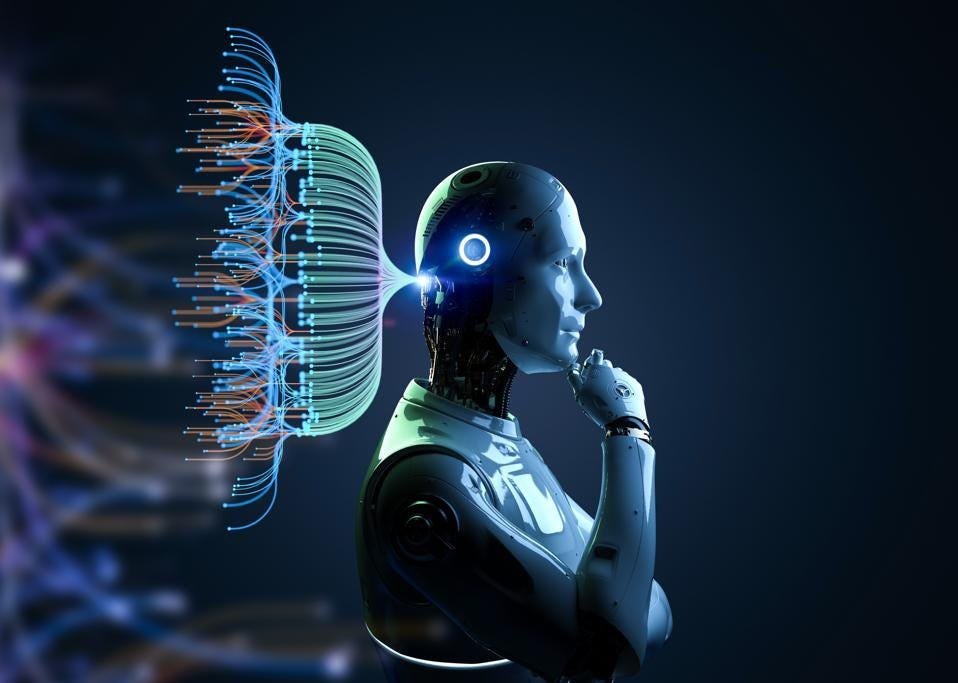The idea of machines that can think and learn like humans has fascinated us for generations. From sci-fi movies where robots solve impossible problems to AI systems that reshape entire industries, the dream of Artificial General Intelligence (AGI) is one of the most ambitious goals in technology. AGI is often seen as the holy grail of AI—a machine with the cognitive abilities of a human, capable of learning new skills, solving problems across domains, and adapting to the world around it.
But AGI isn’t just a far-off fantasy anymore. Researchers are making incredible strides toward creating machines that can think and reason beyond simple tasks. And while we’re not there yet, the progress is undeniable.
So, what exactly is AGI? Why is it important? And what will it mean for our future? In this blog, we’ll break it down in plain, simple terms, exploring how AGI could change everything and how TechDotBit can help you stay ahead of the curve as we approach this revolutionary milestone.
What is AGI? Think of It as AI on Steroids
First things first: AGI isn’t your average AI. The kind of AI we’re used to today—like the algorithms behind Google searches, Netflix recommendations, or even self-driving cars—is called narrow AI. Narrow AI is designed to excel at a specific task. It’s amazing at processing data for a particular problem but not capable of general learning. For example, a self-driving car might know everything about navigating roads, but it won’t understand how to play a game of chess or diagnose a medical condition.
AGI, on the other hand, is a whole different beast. It’s like taking narrow AI and giving it the ability to think broadly and adapt to new problems on its own. An AGI system could learn to drive a car, figure out complex medical diagnoses, design a building, and even write a novel—all without needing to be retrained for each individual task. It’s human-like intelligence but with the processing power and speed of a machine.
In essence, AGI is not just about making machines smarter. It’s about making them think, learn, and reason like we do.
Why Does AGI Matter? It’s More Than Just Smart Robots
AGI isn’t just a cool concept—it could literally change the world as we know it. Here’s why:
- Solving the Toughest Problems: Imagine a world where AGI helps scientists cure diseases, reverse climate change, or optimize energy use in ways we can’t even comprehend right now. With the ability to process vast amounts of data and learn from it in real-time, AGI could offer solutions to some of the biggest challenges humanity faces.
- Revolutionizing Industries: AGI could completely reshape how industries operate. From finance to healthcare, education to transportation, AGI could take over tasks that currently require human creativity and decision-making, making systems faster, more efficient, and more accurate.
- Changing How We Work: AGI would automate more than just routine tasks—it could handle complex problem-solving that currently only humans can do. This means jobs that rely on knowledge and decision-making could evolve dramatically. While this opens up exciting new possibilities, it also forces us to rethink how we work and what skills will be most valuable in the future.
- Redefining Intelligence Itself: If AGI becomes a reality, it might force us to reconsider what intelligence really means. Will machines have emotions? Will they be able to create art, music, or literature that resonates with us? AGI raises philosophical questions about the nature of creativity, consciousness, and the mind.
How Close Are We to AGI?
This is the million-dollar question: When will we see AGI?
To be honest, no one knows for sure. While current AI systems have made huge leaps, we’re still far from creating true AGI. The complexity of human cognition—how we learn, understand context, and apply knowledge across different situations—hasn’t been fully replicated in machines.
That said, research is moving fast. Companies like OpenAI, DeepMind, and SingularityNET are leading the charge, developing AI systems that can learn in ways that are starting to resemble human intelligence. Take OpenAI’s GPT models (the same technology that powers me!)—these systems can write, summarize, and generate human-like text. It’s impressive, but it’s still not AGI because it doesn’t truly understand the words it’s producing.
DeepMind is another key player, having created AI that mastered games like Go and chess, beating human champions. But again, this is still narrow AI—it’s phenomenal at one task, but can’t generalize beyond that.
In short: AGI isn’t here yet, but we’re making progress. Some experts believe it could take decades, while others think we may see early forms of AGI within our lifetimes.
What Will AGI Mean for You and Me?
The arrival of AGI will have massive implications—not just for tech companies, but for every person on the planet. Here’s a glimpse into what AGI could bring:
- The End of Mundane Work: With AGI, many tasks that people find tedious or repetitive could be fully automated. This means more time for humans to focus on creative, strategic, or meaningful work that can’t easily be done by machines.
- A New Era of Creativity and Innovation: AGI could help us invent and create things that are beyond the scope of current human intelligence. It could collaborate with artists, scientists, and engineers to develop new forms of art, groundbreaking technologies, and even new ways of thinking.
- A More Personalized World: Imagine AGI-driven systems that can tailor services, products, and experiences to your exact needs. Whether it’s personalized healthcare, education, or entertainment, AGI could create hyper-customized experiences based on your unique preferences and habits.
- Ethical Dilemmas: As we get closer to AGI, we’ll need to wrestle with tough ethical questions. Who controls AGI? Should machines have rights? How do we ensure AGI doesn’t become a tool for harm? These are challenges that will require careful thought, not just from developers but from society as a whole.
The Risks and Challenges of AGI: What We Need to Watch For
While AGI offers incredible promise, it also comes with risks. Here are a few key challenges we need to consider:
- Control: Once AGI exists, how do we ensure it remains under human control? The idea of creating a superintelligent system that can outthink humans is exciting but also a little scary. We need to make sure AGI is developed with strict ethical guidelines and oversight.
- Job Displacement: AGI could automate not just manual labor but also cognitive jobs. This means we need to rethink the future of work. Will we need universal basic income to support people whose jobs are replaced by machines? How will we ensure that AGI benefits everyone, not just a select few?
- Bias and Fairness: Just like narrow AI, AGI systems will learn from data, and if that data is biased, the outcomes could be too. Ensuring that AGI is fair, transparent, and free from bias is a critical challenge that researchers are already grappling with.
How TechDotBit Can Help You Navigate the World of AGI
At TechDotBit, we’re passionate about exploring the frontier of AI and helping our readers stay informed and prepared for the future. Here’s how we can support you as AGI research continues to advance:
- Breaking Down Complex Concepts: AGI can feel overwhelming, but we’re here to simplify it for you. Our blogs explain technical concepts in plain language, so you can understand what’s happening without a PhD in computer science.
- Staying Updated: The world of AGI is constantly evolving. We keep you updated with the latest breakthroughs, milestones, and predictions from the biggest players in the field, like OpenAI, DeepMind, and beyond.
- Actionable Insights: Whether you’re an entrepreneur, developer, or just someone curious about AI, we offer practical tips and resources to help you get involved in the AGI conversation, from learning how AI works to exploring its potential impact on your industry.
- Ethical Conversations: As AGI draws closer, ethical discussions are becoming more important. We’re committed to fostering thoughtful debates about the ethical implications of AGI, ensuring that technology serves humanity in positive and inclusive ways.
Conclusion: AGI Is on the Horizon—Are You Ready?
The journey to Artificial General Intelligence is one of the most exciting and challenging frontiers in technology. While we’re not there yet, the possibilities are endless. AGI could revolutionize industries, solve global problems, and reshape how we live and work. But it also comes with risks that we must address responsibly.
At TechDotBit, we’re here to help you stay ahead of the curve. Whether you want to understand the basics of AGI, explore the latest developments, or think deeply about the future of human-machine relationships, we’ve got you covered.
The future is AGI—and it’s coming sooner than you think. Are you ready? Let’s explore this new world together.








